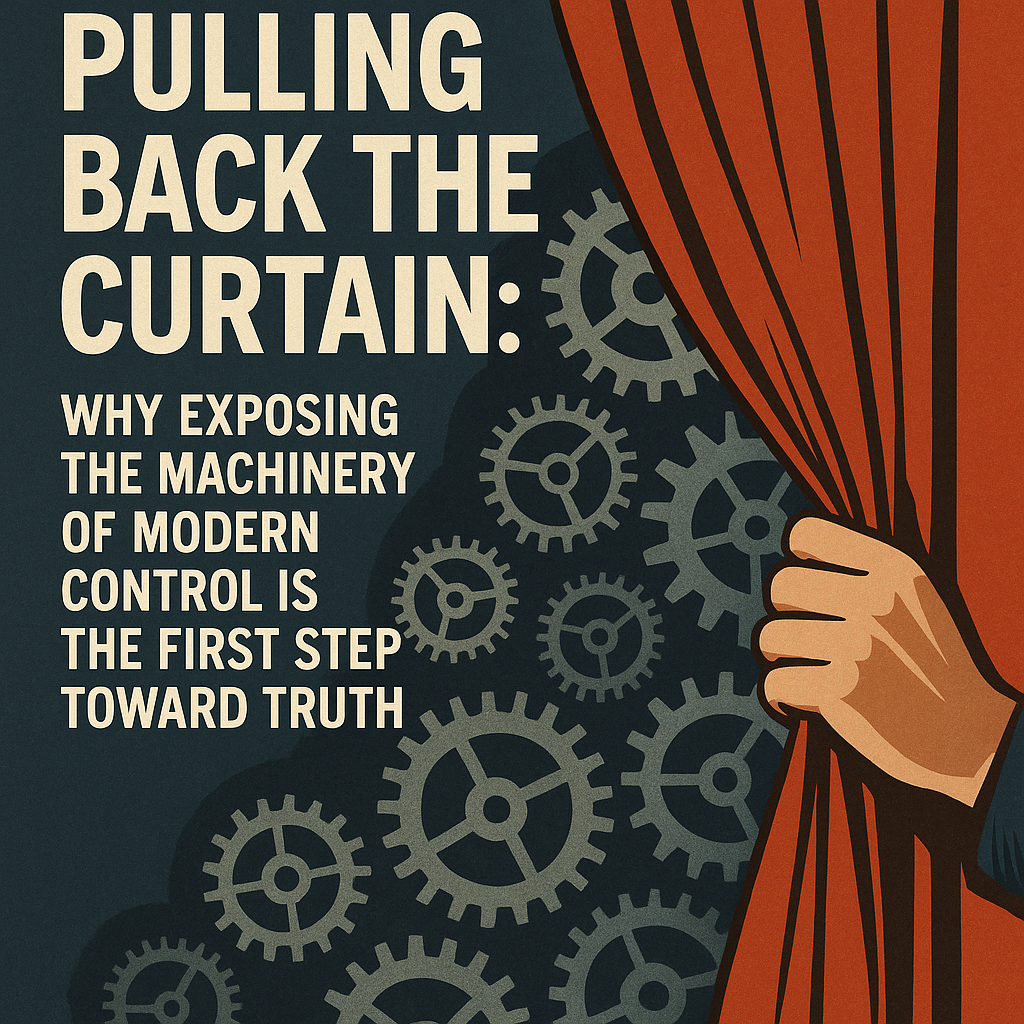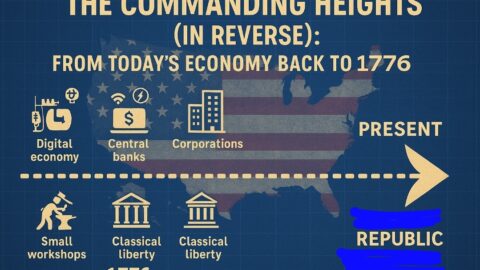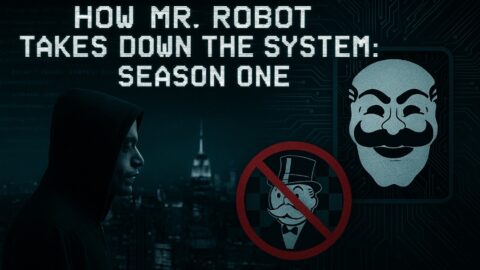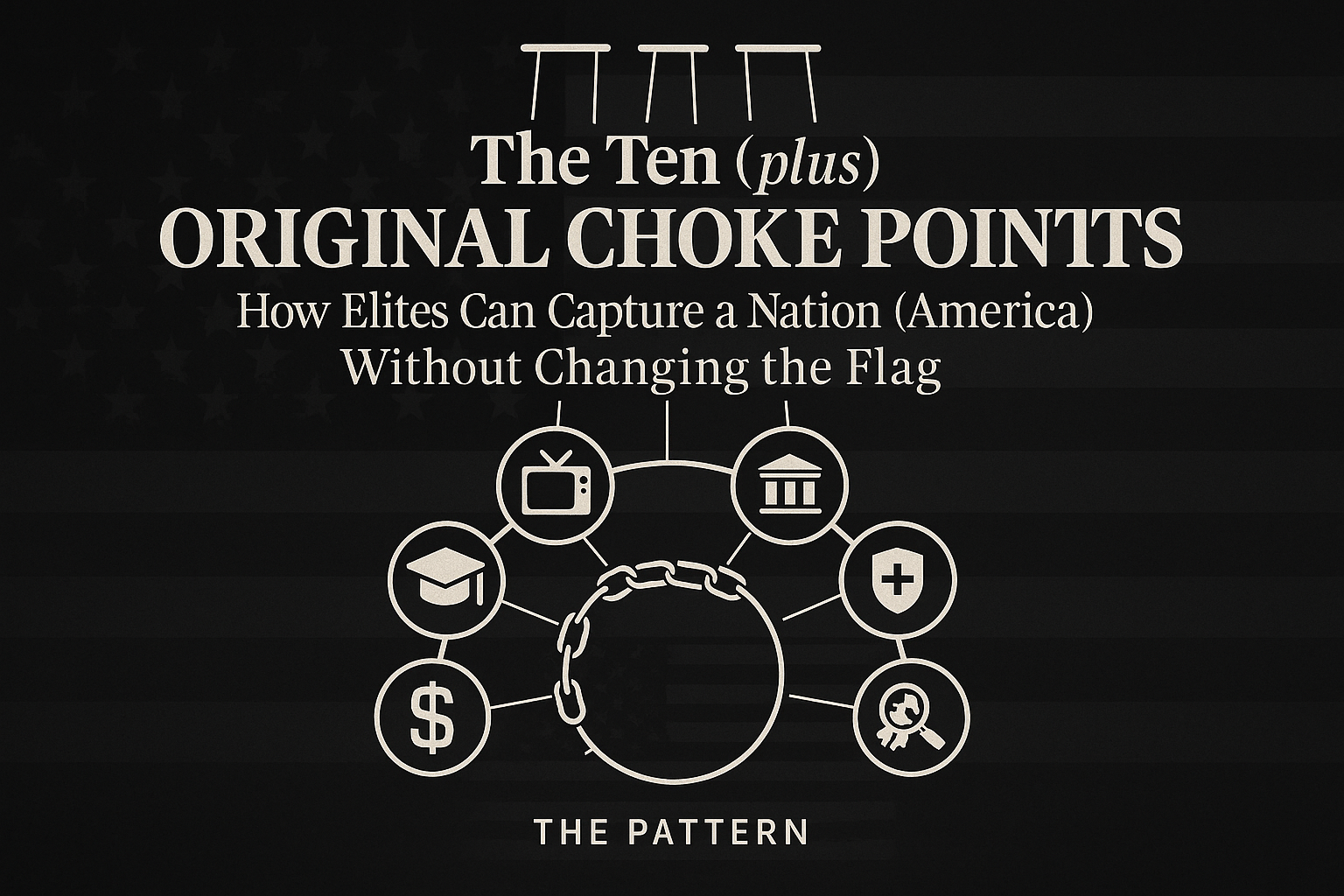“All truth passes through three stages. First, it is ridiculed. Second, it is violently opposed. Third, it is accepted as being self-evident.”
— Arthur Schopenhauer
It is no small thing to confront the manufactured realities of our time. To point out the illusions and deceptions that permeate our politics, our media, our schools, our faith, and even our own minds is to invite ridicule, anger, and sometimes outright hatred. Yet the pursuit of truth demands nothing less. For only by naming the lies, exposing the patterns, and challenging the status quo can we hope to reclaim our agency and rebuild a culture grounded in reality rather than manipulation.
This article will ruffle feathers. It will be attacked, dismissed, or ignored. But if we are to leave a legacy of freedom and wisdom for our children, we must have the courage to reverse engineer the “psyops” and traditions that keep us divided, distracted, and enslaved—no matter whose team it offends.
1. The Engineered Reality: Media, Consent, and Information Control
Today, almost every narrative you encounter—on TV, social media, and even in many classrooms—is manufactured by powerful interests. Edward Bernays, the father of public relations, called this “the engineering of consent.”
Major media corporations, intelligence agencies, and government contractors work together to shape public opinion, silence dissent, and promote distractions that serve their agenda. Astroturfing campaigns flood the internet with fake “grassroots” sentiment, while genuine independent voices are buried by algorithmic censorship or labeled as “misinformation.”
If you think you are immune to propaganda, think again. Modern techniques are so subtle that most people mistake manufactured outrage or virtue signaling for their own beliefs.
2. The War on Memory: Historical Revisionism and Indoctrination
He who controls the past controls the future. School textbooks, Hollywood movies, and even “fact-checkers” regularly rewrite history to suit present power structures. Hard truths—about war, finance, or civil rights—are edited, sanitized, or demonized.
Meanwhile, public education increasingly favors standardized, test-driven obedience over critical thinking or true moral discernment. Students are taught to conform, not to question.
This creates a society where tradition becomes a tool for control, not wisdom—a system that values compliance over conscience.
3. Economic Illusions: The Hidden Machinery of Wealth and Power
We live under the myth that free markets and government intervention are always for the people’s benefit. In reality, central banking, fiat currency, and foreign aid are often tools for elite enrichment and population management.
As Ron Paul said, “Foreign aid is taking money from poor people in rich countries and giving it to rich people in poor countries.”
Endless debt, inflation, and economic “stimulus” keep people dependent and distracted, while those at the top amass unthinkable wealth. Most “development” schemes only entrench dependency and corruption.
4. Faith and False Doctrine: The Hijacking of Religion
Many churches and faith-based organizations have become co-opted by state power and partisan politics. The “prosperity gospel” preaches material gain as godliness; “Christian nationalism” often equates allegiance to state and party with loyalty to God.
Blind support for any nation or leader, justified by scripture taken out of context, is idolatry—replacing living faith with man-made power.
True spirituality demands justice, mercy, and truth—not the sanctification of the status quo or the glorification of violence and domination.
5. Divide, Distract, and Conquer: The Ancient Playbook
Nothing serves power better than a divided public. Identity politics, race, gender, class, and even left-right divisions are weaponized to keep the population fighting each other instead of recognizing the real enemy: those who control the levers of power.
“False opposition” movements (sometimes even created or co-opted by intelligence agencies) serve as safety valves, channeling righteous anger into dead ends.
6. Technocratic and Algorithmic Rule: Welcome to the Alogracy
We are entering an era where algorithms, AI, and big data quietly govern what we see, believe, and do. Surveillance capitalism, digital ID, social credit, and behavior “nudging” have replaced overt authoritarianism with a velvet-gloved technocracy.
AI-powered manipulation creates echo chambers, deepfakes, and digital addiction—making true discernment almost impossible for the distracted and unprepared.
7. Psychological Operations: Trauma, Fear, and Addiction
The machinery of control is not just external. It is deeply psychological.
Constant crises, warnings, and emergencies induce chronic fear, learned helplessness, and dependency on “saviors” from above.
Meanwhile, the dopamine-driven economy of endless entertainment, outrage, and consumerism keeps the public docile and spiritually numb.
8. The Attack on Family and Local Community
Powerful interests know that strong families and local communities are the last barrier to total control. Atomization—turning citizens into isolated individuals dependent on the state or corporations—is the order of the day.
Parental rights are undermined by policy, media, and sometimes even “experts.” Local autonomy gives way to global mandates and one-size-fits-all rules.
9. The Poison of Moral Relativism
One of the most insidious tools of modern control is moral relativism—the belief that right and wrong are simply a matter of personal opinion, social convention, or what “works” for the team. Moral relativism dissolves the boundaries between good and evil, justice and injustice, replacing objective truth with shifting group consensus or political expedience.
Societies steeped in moral relativism lose the ability to resist tyranny, corruption, and abuse, because there is no higher law or principle to which they can appeal. When “anything goes” for the sake of victory or convenience, every abuse can be justified and every crime excused—so long as the right people are in charge or the ends seem desirable.
True freedom and justice depend on the existence and defense of universal moral principles: standards that apply to everyone, in every circumstance, regardless of power, popularity, or pragmatism. Only by rejecting moral relativism and returning to transcendent truth can individuals and societies hope to escape the cycles of deception, conflict, and decay.
10. Legalism and the Death of Principle
Obedience to law, policy, or “procedure” is praised above justice, mercy, or conscience. Legalism—Kohlberg’s Stage 4 morality—encourages blind compliance rather than critical evaluation of whether the law itself is just.
At the same time, moral relativism (“anything goes if it helps our team win”) undermines the very fabric of society.
11. The Illusion of Consent: Democracy Managed from Above
Elections, parties, and public consultation are increasingly theater. Systems are designed to produce preordained outcomes, while giving the illusion of choice.
The ultimate goal: keep the population distracted, demoralized, and too busy to resist—“consenting” by default to a system that neither serves nor respects them.
12. Zionism, Israel, and Christian Support
One of the most powerful and under-examined forces in modern politics is the alliance between Zionist ideology, the state of Israel, and segments of Western (especially American) Christianity. This alliance is promoted through prophecy-based narratives, lobbying, and media influence. It is used to justify U.S. foreign policy decisions that often run counter to American interests and values—while labeling critics as anti-Semitic or “unbiblical.”
This manufactured consensus distorts not only geopolitics but the faith and conscience of millions, redirecting Christian loyalty from universal justice and peace to the unconditional support of a particular nation-state and its political agenda.
13. Team Identity: Republican and Democratic Politics, the Hegelian Dialectic, and Overton Window Tyranny
Modern politics has devolved into a game of team identity: “red” vs. “blue,” Republican vs. Democrat. This tribalism is not accidental; it is engineered to keep the population locked in endless conflict, moving the Overton Window (the range of acceptable debate) incrementally toward tyranny and away from principle.
This dynamic is a classic application of the Hegelian dialectic: create conflict, offer controlled solutions, and nudge society toward a predetermined end. Both sides are used as distractions from the underlying consolidation of power, making it almost impossible for ordinary citizens to unite against their true oppressors.
14. Charismatic Leaders: The Outsourcing of Conscience and Critical Thought
A crucial part of team identity politics and engineered polarization is the elevation of charismatic leaders—figures who seem larger than life, whether in politics, religion, or social movements. These leaders often inspire intense loyalty, not because of their adherence to principle, but because they embody the hopes, fears, or frustrations of their followers.
The danger is that, in the presence of such charisma, individuals unconsciously begin to outsource their own conscience and critical thinking to the leader. Decisions that would otherwise require personal moral reflection are instead deferred to whatever the leader says or does.
This dynamic, repeated throughout history, creates fertile ground for manipulation, abuses of power, and the erosion of both individual responsibility and civic virtue. A society that depends on charismatic leaders for direction is easily steered into tyranny or moral blindness—while believing itself to be awake and “on the right side.”
15. Bankers’ Wars: The Hidden Hand Behind Conflict
Most modern wars are not just about land, resources, or ideology—they are bankers’ wars. Central banks, private financiers, and transnational interests have repeatedly engineered conflicts to expand their power, consolidate debt, and control governments.
The history of the 20th and 21st centuries is a story of war profiteering, debt bondage, and economic subjugation. Nations are destroyed, rebuilt, and indebted in cycles that benefit a small elite while leaving the masses impoverished and traumatized.
16. Follow the Money: Organizations, Players, Terrorist Fronts, and Nations
To truly understand any major event—whether war, terrorism, or social upheaval—one must follow the money. The same oligarchic and banking networks that control governments often fund and arm both sides of a conflict, launder money through “humanitarian” NGOs, and use terrorist fronts as proxies for geopolitical chess moves.
Tracing the financial flows reveals connections between criminal syndicates, intelligence agencies, “legitimate” corporations, and the shadow world of international intrigue.
The real power is not in the flags, speeches, or ideologies—but in the invisible networks of money and influence that shape the course of history behind closed doors.
17. The Prussian-Rockefeller Education System: The Manufacture of Obedience and the Machinery of Propaganda
Modern public education did not arise by accident. The Prussian model—adopted and refined in America by figures like John D. Rockefeller—was explicitly designed to produce compliant, orderly, and predictable citizens. Its core was not to foster independent, critical thinkers, but to train factory workers, bureaucrats, and soldiers who would follow instructions, respect hierarchy, and fit into the emerging industrial and corporate system.
The Rockefeller Foundation’s massive investment in education cemented this model in the U.S. and globally, shaping generations to value conformity over curiosity, and obedience over innovation. Curriculum was standardized; dissent, moral reasoning, and genuine inquiry were discouraged. Propaganda became an institutionalized component, teaching not just what to think, but how to think (and what to avoid thinking about).
The result is a society trained from childhood to outsource thinking to experts and authorities, to trust the system over their own conscience, and to accept the narratives handed down by media and government. This is the silent engine of modern propaganda—a system so pervasive most people do not realize how deeply it shapes their perceptions, beliefs, and possibilities.
Only by exposing and reforming this system can future generations hope to reclaim their minds, their moral agency, and their ability to resist the illusions of power.
18. Marriage, Family, and the Keeping of Vows: The Foundation for the American Way of Life
No society can endure, let alone thrive, without strong families built on trust, fidelity, and the honoring of sacred vows. The erosion of marriage, the normalization of broken homes, and the abandonment of parental responsibilities have undermined not only personal well-being but the very fabric of the American experiment in liberty.
Historically, the family was understood as the first and most important institution for teaching virtue, responsibility, and self-governance. A child raised in a stable, loving home—where parents honor their commitments to each other and to their children—learns the essential skills of discipline, empathy, sacrifice, and trust. These are the same virtues that make democracy, free markets, and civil society possible.
The widespread failure to keep marriage vows and to place family above personal gratification has fed cycles of poverty, alienation, and generational trauma. As families fracture, the state and other impersonal systems rush in to fill the void, increasing dependence, loneliness, and the ease with which populations can be controlled.
The restoration of marriage and family—not as arbitrary traditions, but as divinely-rooted covenants and the foundation for all other institutions—is essential to the restoration of American life and the defense of genuine liberty. Only by keeping our promises to one another—beginning at home—can we rebuild a society worthy of trust, hope, and freedom.
19. God as the Source of Morality: Principle-Centered Life and Stage 6 Maturity
The antidote to the manipulation of team identity, charismatic leaders, and manufactured consensus is a return to true principle-centered living—anchored in God as the ultimate source of morality. In Lawrence Kohlberg’s theory of moral development, Stage 6 represents the highest form of moral reasoning: acting according to universal ethical principles, such as justice, truth, and the sanctity of life, rather than obedience to authority, peer pressure, or group loyalty.
Tragically, many claim to put God first but fail to move beyond Stage 4 (legalism/authority-based morality), remaining trapped in obedience to human leaders, institutional dogmas, or social consensus. True allegiance to God requires courage, discernment, and personal responsibility—a willingness to challenge both the crowd and the powerful when they violate higher law.
A society built on Stage 6 morality, with God as the center and conscience as the guide, is far less susceptible to psyops, propaganda, and tyranny. It replaces the shifting sands of identity and charisma with an unshakeable foundation. The challenge—and opportunity—for each generation is to embody and teach this form of mature, principled living, refusing to outsource one’s soul to any earthly authority.
The Cost—and Necessity—of Truth
To expose these realities is to invite scorn, opposition, and personal risk. Many will be offended, for their entire identity is built on these illusions.
But, as Schopenhauer warned, all truth is first ridiculed, then violently opposed, and finally accepted as self-evident. History belongs to those who dare to speak what others refuse to see.
If you want to change the world, begin by reclaiming your mind, your history, your faith, your economy, your family, and your moral compass from those who seek to own them.
Only then can we hope to restore a society worthy of truth, freedom, and genuine human dignity.
If you’re ready to go further, join the conversation, share the evidence, and help others break the spell. The future depends on those who are willing to speak the truth—no matter the cost.
Conclusion: The Only Enduring Solution — Returning to Principle-Centered Living
All the mechanisms of control, manipulation, and deception described above—whether rooted in politics, finance, technology, education, or media—ultimately thrive because individuals and societies lack a solid, unchanging foundation. Propaganda and corruption find fertile ground when people are anchored to group identity, charismatic leaders, or the shifting sands of social consensus rather than to universal principles.
The only enduring answer is to reclaim a principle-centered life, with God as the true source of morality. In Kohlberg’s theory of moral development, this is Stage 6: living by conscience, truth, and transcendent values, not by mere obedience to authority, team, or tradition.
God as the Source of Morality: Principle-Centered Life and Stage 6 Maturity
The antidote to manipulation and tyranny is a return to true principle-centered living—anchored in God as the ultimate source of morality. In Lawrence Kohlberg’s theory of moral development, Stage 6 represents the highest form of moral reasoning: acting according to universal ethical principles, such as justice, truth, and the sanctity of life, rather than obedience to authority, peer pressure, or group loyalty.
Tragically, many claim to put God first but fail to move beyond Stage 4 (legalism/authority-based morality), remaining trapped in obedience to human leaders, institutional dogmas, or social consensus. True allegiance to God requires courage, discernment, and personal responsibility—a willingness to challenge both the crowd and the powerful when they violate higher law.
A society built on Stage 6 morality, with God as the center and conscience as the guide, is far less susceptible to psyops, propaganda, and tyranny. It replaces the shifting sands of identity and charisma with an unshakeable foundation. The challenge—and opportunity—for each generation is to embody and teach this form of mature, principled living, refusing to outsource one’s soul to any earthly authority.
Only by reclaiming this foundation—individually and collectively—can we hope to build a society that is resistant to deception and worthy of true freedom.







